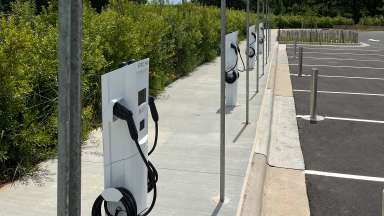The City of Raleigh has earned a Silver designation from the national Charging Smart program. This award recognizes the City's leadership in electric vehicle (EV) planning and infrastructure.
Raleigh is the first city in North Carolina—and the entire Southeast—to earn a Silver Charging Smart designation.
The City’s EV Implementation Rollout Strategy helped earn the designation. It outlines a 10-year plan to shift the City fleet of nearly 5,000 vehicles and equipment to electric and clean fuels.
Examples of key efforts include:
- Installing EV chargers in key community locations like the new Gipson Play Plaza at Dix Park;
- Launching an electric fleet for the City’s motor pool and the facilities maintenance teams; and,
- Working across departments to support EV goals.
Many City departments worked together to make these efforts possible, including:
- Office of Sustainability;
- Fleet Management Operations Division of Engineering Services;
- Planning and Development;
- Raleigh Parks, Recreation and Cultural Resources; and,
- Many other partnerships across the City and community.
Charging Smart is led by partners including the Interstate Renewable Energy Council (IREC) and the North Carolina State University Clean Energy Technology Center, with funding from the U.S. Department of Energy Vehicle Technologies Office. The City of Raleigh worked with Charging Smart's no-cost technical assistance team to increase local knowledge of EV infrastructure for the benefit of economic development and clean energy goals.
Raleigh was one of the first cities in the country to adopt EV infrastructure and continues to lead the way in supporting the growth and accessibility of clean energy across Raleigh and the region. Raleigh has seen a 400 percent increase in public EV chargers over 12 years.
These and other actions will make it faster, easier, and more affordable for local residents, businesses, and nonprofit organizations to install EV infrastructure and adopt EVs.
Transportation is the largest source of greenhouse gas emissions in Raleigh, making up more than half of community-wide emissions. Expanding adoption of electric vehicles and access to EV chargers helps the City move closer to its goals of reducing GHG emissions 80 percent by 2050, building community resilience, and increasing health and accessibility to clean energy across the community.
The City of Raleigh leads by example in climate action. Learn more about Raleigh’s Community Climate Action Plan.
